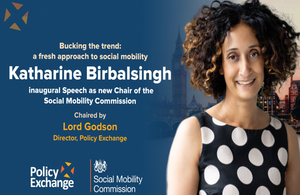Too much focus on a small minority getting to the top, warns SMC chair
Katharine Birbalsingh sets out her vision for a broader view of social mobility

The social mobility world is too fixated with a small minority of people from poor backgrounds聽getting into the best universities and elite professions, Katharine Birbalsingh will argue today (Thursday 09 June) as she outlines her new vision.
In her inaugural speech as Chair of the Social Mobility Commission, she will say that it鈥檚 time for a radical shift in how the UK views social mobility. Too often success has been defined as a caretaker鈥檚 daughter going to Oxbridge and becoming a top surgeon, she believes.
Birbalsingh, also headmistress at Michaela Community School, wants to challenge this traditional approach to social mobility. More attention should be given to those people taking small steps up the ladder - from the bottom and from the middle rungs, she argues. These could include: those whose parents were out of work getting a job; the son of a postman becoming a branch manager; the daughter of a care worker becoming a primary school teacher.
She intends to look at ways of creating more opportunities in the regions too so that not everyone feels they have to move to London or the southeast to get a good job. She supports the Levelling Up agenda and wants to ensure that education, skills training and routes into work are seen as priorities across the UK.
鈥淲e want to move away from the notion that social mobility should just be about the 鈥榣ong鈥� upward mobility from the bottom to the top - the person who is born into a family in social housing and becomes a banker or CEO,鈥� Birbalsingh is expected to say.
鈥淲e want to promote a broader view of social mobility, for a wider range of people, who want to improve their lives, sometimes in smaller steps,鈥� she will add. 鈥淭his means looking at how to improve opportunities for those at the bottom - not just by making elite pathways for the few - but by thinking about those who would otherwise be left behind.鈥�
Speaking at an , she will emphasise there鈥檚 not 鈥渁 one size fits all model of social mobility鈥� and there are many forms of success.
鈥淚f a child of parents who were long-term unemployed, or who never worked, gets a good job in their local area, isn鈥檛 that a success worth celebrating? Would we really say that it doesn鈥檛 count as mobility because they are not a doctor or lawyer?鈥� she will ask.
Birbalsingh and Alun Francis, her deputy, intend to pose difficult questions and tackle uncomfortable truths head-on. For instance, they will argue that widening access to university has not always brought the dividends hoped for and has diverted attention from the 50 per cent pursuing other routes.
鈥淲hat can we do for those young people and adults who have not followed the higher education pathway but still need a route to high skills and good occupational opportunities?鈥� she will ask.
鈥淎nd what more should be done about those at the very bottom - particularly those with low levels of basic literacy and numeracy - who cannot therefore take advantage of higher learning and are unable to access higher paid work?鈥�
Birbalsingh will also challenge the popular narrative that social mobility is getting worse. She will say the picture is complex but the latest analysis from the Commission shows that occupational mobility has been stable or slightly improving for decades. There is less consensus on other areas like income, housing and wealth. But the SMC will look at them more closely next year.
The SMC State of the Nation 2022 report, to be published later this month, will set out a framework to revise the way the Commission has traditionally measured social mobility. It will provide a more accurate view of who is moving up, down, or staying put.
The new social mobility index will track actual social mobility - comparing where people start and end, in their occupations, incomes, and other outcomes, all across the UK to show who is mobile, and where. 鈥淚t means being clearer about where mobility is working well - and being clearer about the various factors which help make this happen.鈥�
Birbalsingh also intends to set out the key priorities for the Commission:
- Education - Covering early years, schools and universities, but also other routes into work such as further education and apprenticeships. Birbalsingh wants to look at ways of helping families and parents to support their children to ensure they get a good start in life. She believes that parents are a child鈥檚 first teacher and we need to help parents know what is needed to boost their child鈥檚 development - such as reading books to them.
- Employment - The SMC will go beyond the large professional firms in the City, many of whom聽already have plans for more diverse workforces, to look at how small businesses can generate opportunity.
- Enterprise and the economy - The Commission will look at the creation of opportunities, their geographical spread and the role of enterprise in sometimes challenging social mobility hierarchies - all central to the Government鈥檚 levelling up agenda. It will focus on local neighbourhoods where educational and economic opportunities are poor across generations.
Birbalsingh believes that everyone should be given the opportunity to succeed and that key role models such as parents, teachers and employers can provide the support for that to happen.聽 Nobody should be a prisoner of the circumstances in which they were born.
鈥淲e want to champion a fresh approach, which sees social mobility as the process of enabling everyone to find and apply their talents in ways that they enjoy and gives them purpose, and for our wider society and economy鈥�, she is expected to say.
For further information, please contact:
Jill Sherman, SMC Head of Communications:
jill.sherman@socialmobilitycommission.gov.uk or 07384 870965
Emily-Rose Rolfe, Senior Media and Digital Manager:
emily-rose.rolfe@socialmobilitycommission.gov.uk